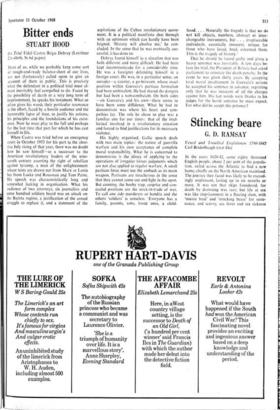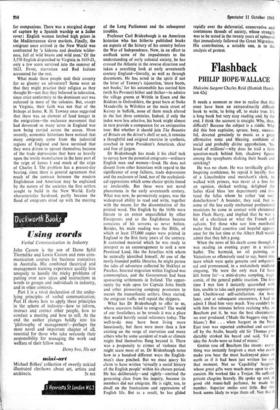Vexed and Troubled Englishmen 1590-1642 Carl Bridenbaugh (ow , 84s)
Stincking beare
G. D. RAMSAY
In the years 1620-42, some eighty thousand English people, about 2 per cent of the popula- tion, sailed across the Atlantic to find a new home, chiefly on the North American mainland. The journey they faced was likely to be exceed- ingly unpleasant, lasting up to six months or more. It was not that ships foundered, for death by drowning was rare; but life at sea was like imprisonment in a floating slum, with 'mustie bred' and `stincking beare' for suste- nance, and scurvy, sea fever and sea sickness for companions. There was a marginal danger of capture by a Spanish warship or a Sanyo rover: English women fetched high prices in the Mediterranean slave markets. Finally, the emigrant once arrived in the New World was confronted by 'a hideous and desolate wilder- ness, full of wild beasts and wild men.' Of the 3,570 English dispatched to Virginikin 1619-21, only a few score survived into the summer of 1623. Fever, starvation and Red Indians accounted for the rest.
What made these people quit their country for so gloomy an adventure? Some went so that they might practice their religion as they thought fit—not that they believed in toleration, since strict conformity to the dominant sect was enforced in most of the colonies. But, except in Virginia, their faith was not that of the bishops at home. R. H. Tawney once suggested that there was an element of land hunger in the emigration—the enclosure movement that had devoured so many acres in England was now being carried across the ocean. More recently, economic historians have noticed that many emigrants came from the industrial regions of England and have surmised that they were driven to uproot themselves because of the trade depressions that bore so heavily upon the textile manufacture in the later part of the reign of James I and much of the reign of Charles L The problem has a present-day bearing, since there is general agreement that much of the contrast between the modern Englishman and American may be explained by the nature of the societies the first settlers sought to build in the New World. Early characteristics hardened, partly because the flood of emigrants dried up with the meeting of the Long Parliament and the subsequent troubles.
Professor Carl Bridenbaugh is an American historian who has hitherto published books on aspects of the history of his country before the War of Independence. Now, in an effort to outflank some of the impediments to the understanding of early colonial society, he has crossed the Atlantic in the reverse direction and taken a searching look at early seventeenth century England—literally, as well as through documents. He has acted in the spirit if not the letter of Tawney's injunction, 'more boots, not books,' for his automobile has carried him (with his Pevsner) hither and thither—to admire the village greens at Writtle in Essex and the Baldons in Oxfordshire, the great barn at Stoke Mandeville in Wiltshire or the main street of Kersey in Suffolk, none of them much altered in the last three centuries. Indeed, if only the index were less selective, his book might almost in turn provide a companion for an antiquarian tour. But whether it should join The Beauties of Britain on the driver's shelf or not, it remains a thoughtful and original exercise in synthesis, couched in terse President's American, clear and free of jargon.
Dr Bridenbaugh has made it his chief task to survey how the potential emigrants—ordinary English men and women—lived. He does not dissent from other historians with regard to the significance of crop failures, trade depressions and the enclosure of land, nor of the ecclesiasti- cal oppressions which some choice spirits found so intolerable. But these were not novel- phenomena in the early seventeenth century. What was new, he persuasively argues, was the widespread ability to read and write, together with the means for the dissemination of the printed word. The English by the 1630s were literate to an extent unparalleled by other Europeans; and so the Englishman became conscious of his sorrows as never before. Besides, his main reading was the Bible, of which at least 375,000 copies were printed in England in the first forty years of the century. It contained material which he was ready to interpret as an encouragement to seek a new Promised Land, like the Israelites with whom he naturally identified himself. At one of the newly-founded public libraries, he might peruse the tales of adventure collected by Hakluyt or Purchas. Internal migration within England was commonplace, and the Government had been sponsoring settlements in Ireland. The oppor- - tunity lay wide open for Captain John Smith and other pioneering company promoters to recruit the transatlantic settlers. Once started, the emigrant traffic well repaid the shippers.
- What has Dr Bridenbaugh to offer to us, whose ancestors failed to emigrate? The world of our forefathers as he reveals it was a place that would horrify social reformers today. The well-to-do may have been living more luxuriously, but there were more than a few existing on the verge of starvation and many others who by some accident of trade or climate might find themselves flung beyond it. There was a propensity to crimes of violence that might scare most of us. Dr Bridenbaugh notes how in a hundred different ways the English- man's shoe pinched. But we must query his claim to have written 'virtually a social history of the English people' within his chosen period. He has deliberately—and rightly—omitted the governing class from his inquiry, because its members "didnot emigrate. He is right, too, to dwell on the frustrations and oppressions of English life. But as a result, he has glided rapidly over the deferential, conservative and continuous threads of society, whose strength was to be tested in the twenty years of upheaval that immediately followed the Great Migration. His contribution, a notable one, is to the analysis of protest.







































 Previous page
Previous page